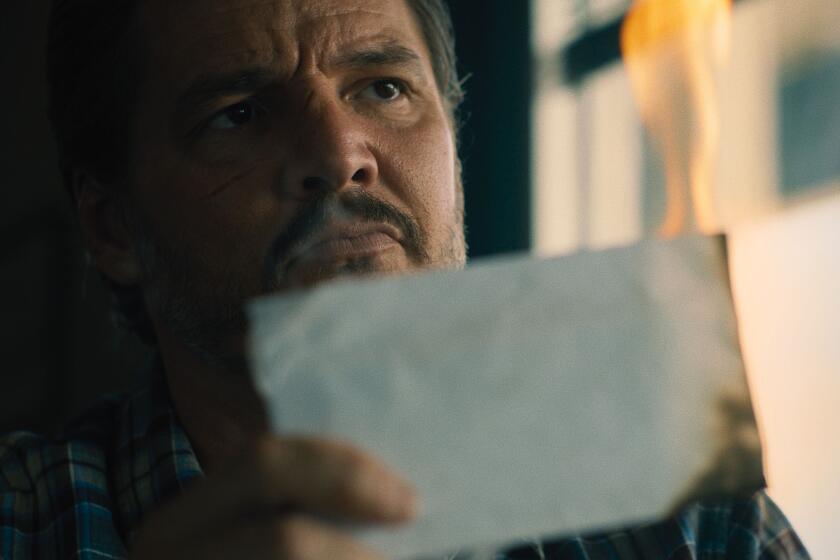Classic Hollywood: Bing Crosby, a guy who could do it all
- Share via
Bing Crosby is probably best known these days for the rendition of the Oscar-winning Irving Berlin tune “White Christmas” that he introduced in the 1942 film “Holiday Inn” and for his 1977 duet of “Little Drummer Boy” and “Peace on Earth” with David Bowie that’s become a perennial.
But a new PBS “American Masters” documentary, “Bing Crosby Rediscovered,” which premieres Tuesday, illuminates just what a force he was in radio, film, television and music for generations of audiences. (A companion CD also has been released.)
Even 37 years after his death at age 74, Crosby remains one of the most popular performers in history. He has the most No. 1 records — 41 — with the Beatles a distant second.
In addition, Crosby was the top box office star from 1943 to ‘48, and his films sold more than 1 billion movie tickets. He won an Oscar for the 1944 best picture winner, “Going My Way,” and nominations for the 1945 sequel, “The Bells of St. Mary’s,” and 1954’s “The Country Girl.” His “Road” comedies with Bob Hope, including 1942’s “Road to Morocco,” are as fresh and funny as they were seven decades ago.
“It’s really hard for people to understand today. He was all of these things at the same time — the bestselling recording artist, the No. 1 movie box office guy and the biggest thing on radio, with 50 million listening to ‘The Kraft Music Hall’ every week,” said Robert S. Bader, vice president of Crosby’s estate, HLC Properties Ltd., and head of the Bing Crosby archives.
Despite all of his success, Crosby described himself simply as “an average guy who could carry a tune.”
“What emerged for me doing this,” said “Bing Crosby Rediscovered” director Robert Trachtenberg, “is that Crosby doesn’t have the neurotic undercurrent of contemporaries like Judy Garland and Frank Sinatra, where each performance was kind of a really dramatic heart on your sleeve, I need the audience.”
Crosby, he discovered, “was secure in who he was and so confident and at ease with himself. In some ways, that is what made him so universally popular. Like someone says in the movie, he was family.”
Narrated by Stanley Tucci, the documentary features interviews with Crosby’s widow, Kathryn, and their three children, Mary, Harry and Nathaniel, all of whom appeared on Crosby’s TV specials, as well as singers Tony Bennett and Michael Feinstein, record producer Ken Barnes and biographer Gary Giddins.
The Crosby estate opened up the archives for the documentary, which features never-before-seen home movies, photos and even Dictabelt recordings.
Mary Crosby noted: “We had no control over what the product was going to be. I think it’s an honest portrayal of who Dad was. They don’t put him on a pedestal, but it very much shows who he was as a man as well as an artist.”
She said she’s pleased the film addresses claims that Crosby was an abusive father to his four late sons — Gary, Philip, Dennis and Lindsay — by his first wife, singer Dixie Lee, who battled alcoholism before her death of cancer in 1952. Since the publication of Gary Crosby’s 1983 autobiography, “Going My Way,” in which he described growing up in “a house of terror,” Bing Crosby has been vilified in many circles.
“Dad was such an under-the-radar guy,” said Crosby. “That’s how we were raised. When Gary’s book came out we thought if we don’t deal with it this will go away. The tragedy is, of course, it is the one thing that stuck instead of his great, incredibly legacy of joy and artistry and music.”
In the documentary, she recalls a lunch with Gary Crosby after the publication of his book at which he confessed to her that he had exaggerated some of his claims because he was told he would sell more copies.
Bing Crosby never denied he disciplined his sons, including spanking them, according to Trachtenberg. (The sons all suffered from problems related to alcohol and substance abuse.) “You have to realize this guy was born in 1903, and it was a completely different way of thinking and raising kids. And Bing admits at the time he was a failure as a father,” Trachtenberg noted.
Though the Dictabelt recordings show how he tried to get help for his sons, Crosby was rarely home with them because of his career demands. “When his kids were growing up, he was doing it all and doing it all at once,” said Bader.
But that wasn’t the case with his second family, whom he raised in Hillsborough in the Bay Area. The children of that marriage remember their dad with great affection.
“He was of retirement age when I was growing up and probably had more time to spend with us,” said Harry Crosby. “He was great with me. My father and I had a special relationship. He was very warm with us and nurturing.”
Twitter: @mymackie
More to Read
Only good movies
Get the Indie Focus newsletter, Mark Olsen's weekly guide to the world of cinema.
You may occasionally receive promotional content from the Los Angeles Times.











